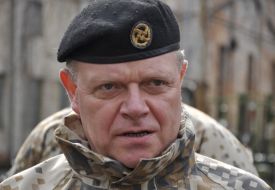Baltic States – CIS, Direct Speech, Latvia, Legislation, Russia, Transport
International Internet Magazine. Baltic States news & analytics
Friday, 26.04.2024, 18:36
Graube: Russia's actions near Latvia's border "increasingly provocative"
 Print version
Print version |
|---|
According to Graube, Russia's actions are becoming increasingly pronounced in the sea, where military vessels cruise or hover near other countries' territorial waters, often without rational reason. Likewise, military aircraft for no apparent reason appear near the Baltic countries' borders. They do so with transponders turned off, nevertheless, they are detected thanks to the Armed Forces' new radars.
Although Russia's actions cannot be perceived as a direct military threat, the unpredictability is "alarming", as they heighten the risk of conflict, said Graube.
Commenting on media reports that the United States is working on new plans taking into account a possible conflict with Russia in the Baltic countries, Graube said that the existing plans were revised by NATO as well as Latvia, and not because of Russia, but because of the increasing risks of terrorism, and mass migration in Europe is also taken into consideration.
There are U.S. troops stationed in Latvia, therefore the United States' military plans must provide clear instructions for these soldiers in various situations, explained Graube.
As reported, for the first time since the collapse of the Soviet Union, the U.S. Department of Defense is reviewing and updating its contingency plans for armed conflict with Russia, the "Foreign Policy" magazine reports.
The Pentagon generates contingency plans continuously, planning for every possible scenario – anything from armed confrontation with North Korea to zombie attacks. But those plans are also ranked and worked on according to priority and probability.
After 1991, military plans to deal with Russian aggression fell off the Pentagon's radar. Now, according to several current and former officials in the State and Defense departments, the Pentagon is dusting off those plans and re-evaluating them, updating them to reflect a new, post-Crimea-annexation geopolitical reality in which Russia is no longer a potential partner, but a potential threat.
The new plans, according to one senior defense official familiar with the updated plans, have two tracks. One focuses on what the United States can do as part of NATO if Russia attacks one of NATO's member states; the other variant considers American action outside the NATO umbrella. Both versions of the updated contingency plans focus on Russian incursions into the Baltics, a scenario seen as the most likely front for new Russian aggression. They are also increasingly focusing not on traditional warfare, but on the hybrid tactics Russia used in Crimea and eastern Ukraine: "little green men," manufactured protests, and cyberwarfare.








 «The Baltic Course» Is Sold and Stays in Business!
«The Baltic Course» Is Sold and Stays in Business!

